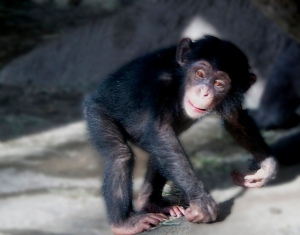Clowning and Human Evolution
Posted: 24 November 2014 Filed under: Ideas, Inspiration, Learning | Tags: clowning, pleasure, spymonkey Leave a commentFrom Spymonkey to Actual Monkeys
I did a clowning course with Spymonkey in September and I am still absorbing the week (it was great, go and do it). My main note was to show my pleasure more, which is not surprising to me. I used to be really shy, and I still get shy in large groups sometimes. Performing standup and improv helped me to change that a lot, but it was not my habit to show emotions freely. So it was a big lesson to learn that when I started and I’m still working on it. I used to find the idea of showing emotions on stage terrifying, and it can still be intimidating but overall I’m grateful I get the chance to practice it and do something that I love. It’s really useful for characters and its fun to explore that on stage.
Showing my pleasure. That made me think about people I have seen sharing their pleasure. All the great teachers I have had, at school and later, all the best speakers and performers- they all obviously love what they are doing and love to share it. It’s a good path to follow.
What does this have to do with human evolution?
I read an article in Scientific American Mind (Vol 25, No.5) called Let’s Talk, that made me think about how performances work. It’s about the common rules of languages across the world and what they tell us about human communication.
One difference between human and animal communications is that animals rarely require a response. For example, if a chimp shouts an alarm call it doesn’t expect another chimp to reply, but a lot of our communication directly requests a response. “Hello, how are you?”. If you don’t get a response you get confused or annoyed at the other person for ignoring you.
But I think sadly a lot of communication is mixed up in real life. Not a lot of our cultural dialogue is about vulnerability and honesty so we learn to close it off. People drop hints and talk sideways then get surprised when nobody understands. Then we go to the movies or a theatre to see raw honesty played out in front of us. That’s back-to-front way of doing things.
So in my humble opinion, combining the teachings of Spymonkey and current linguistic evaluations of the true nature of human communications, I deduce that showing pleasure is a really pure form of communication. It’s saying “I am enjoying this,” and inviting the audience to come along for the ride. It’s weird and its humbling to do something that is essentially asking people to accept and trust you, as you are. It’s not always comfortable but it is always effective.
What’s your pleasure?
PS
(I also love story-telling so check out my Epic Tales workshop this Wednesday in London. Only £5 for a taste of my secrets. Full details here.)



